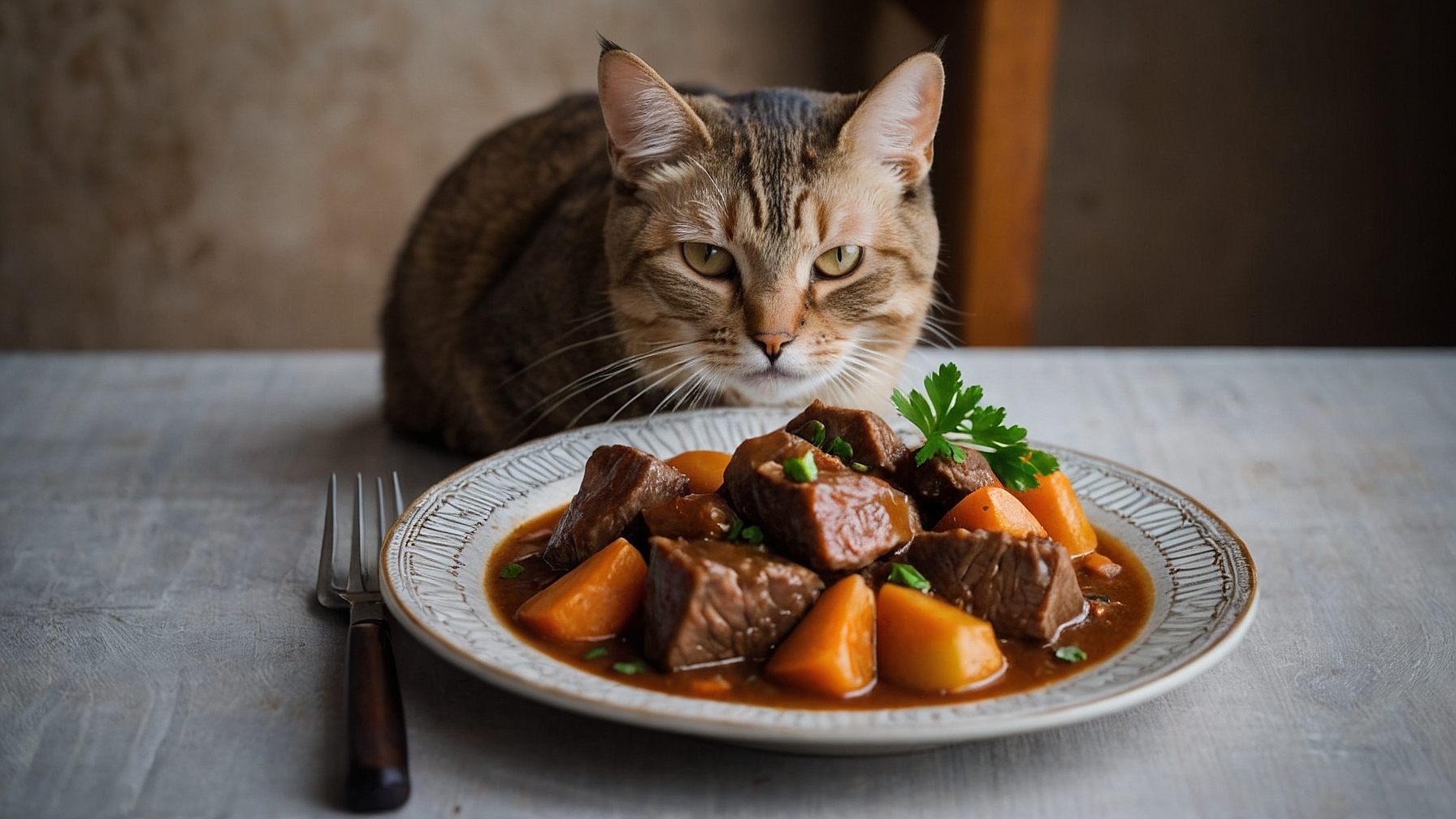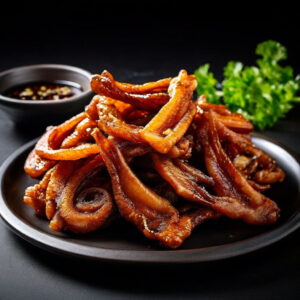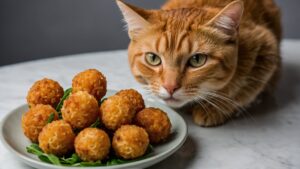Beef stew is a hearty comfort food that’s popular with many humans. This meat and vegetable medley stew typically contains beef, potatoes, carrots, onions, celery, and a rich savory gravy or sauce. But while we may love beef stew on a cold day, is this human food safe and healthy for our feline friends to eat?
Table of Contents
Can Cats Eat Beef Stew?
In short – no, cats should not eat beef stew. While beef stew may seem like it could make an appetizing meal or treat for cats, the reality is this dish contains several ingredients that can be toxic and harmful to cats. As obligate carnivores, cats have very different nutritional needs than humans, and are not adapted to digest many of the components found in beef stew.
Feeding beef stew to cats can pose the following health risks:
- Onions and garlic – Toxic to cats and can damage red blood cells
- Fatty gravy – Too high in fat and seasoning for cats, risks pancreatitis
- Beef – Often too fatty for cats long-term, may cause digestive upset
- Starchy vegetables – Potatoes and carrots hard for cats to digest
Due to these dangers, it’s best to avoid sharing beef stew with cats. The seasoned gravy, fatty meat, onions, garlic, and vegetables make this meal inappropriate for felines. There are many other people foods cats can eat, but beef stew does not make that list.
Ingredients in Beef Stew That Are Unsafe for Cats
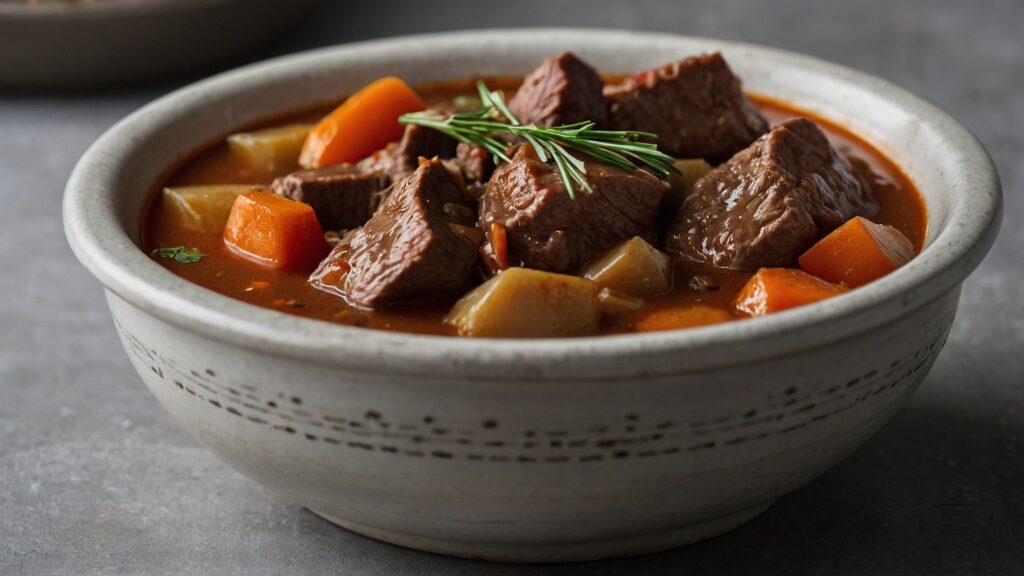
Let’s take a closer look at some of the concerning ingredients commonly found in beef stew recipes:
Onions and Garlic
One of the biggest reasons cats cannot eat beef stew is the onion and sometimes garlic used for flavoring. Onions and garlic contain compounds called thiosulfates that are toxic to cats when ingested.
Cats lack the liver enzymes needed to properly digest thiosulfates. As a result, the thiosulfates can lead to oxidative damage to red blood cells, forming dense and dangerous Heinz bodies within the cells. This process severely impairs the ability of the red blood cells to function and transport oxygen.
Onion and garlic toxicity can cause the following symptoms in cats:
- Lethargy, weakness
- Pale gums
- Rapid breathing
- Elevated heart rate
- Brown or orange urine
In severe cases, it can lead to hemolytic anemia which requires emergency veterinary treatment. Onions are considered more toxic than garlic to cats, but both should be avoided. Even small amounts found in beef stew can be harmful, so it’s not worth the risk.
Gravy or Sauce
The rich gravy or sauce in beef stew poses a couple hazards for cats:
Fat Content – Beef stew gravy is high in fat from the meat drippings and oils used to brown the vegetables. The high saturated fat content can lead to pancreatitis which is a serious inflammatory condition of the pancreas. Cats have trouble digesting and metabolizing fat.
Seasoning – Stews are flavored with onions, garlic, salt, herbs, sometimes wine or Worcestershire sauce. These all contain additives and spices that can upset a cat’s stomach. Cats should not consume added salt or seasoned human foods.
Beef
Beef can make a healthy treat for cats on occasion. However, the beef found in beef stew may be:
- Fatty cuts – Fattier, more marbled cuts of beef are usually used in slow-cooked stews. This extra fat is difficult for cats to digest.
- Overcooked – The long cooking times result in drier, stringier beef. Cats prefer and digest raw or lightly cooked meat best.
A few bites of lean, cooked beef won’t harm cats. But the high fat beef often found in beef stew can lead to diarrhea, vomiting, and pancreatitis when fed long-term or in quantity.
Vegetables
Common veggies in beef stew like carrots and potatoes are very starchy and high in carbohydrates. Cats’ bodies are not designed to digest plant matter like vegetables well. The complex carbs can be hard for their digestive system to break down.
Some cats may nibble small amounts of non-toxic vegetables out of curiosity. But large quantities of starchy veggies like in beef stew can lead to digestive upset like vomiting, diarrhea, and gas.
Health Risks of Feeding Beef Stew to Cats
To recap, here are some of the potential health issues that can arise if cats eat beef stew:
- Onion/garlic toxicity – Anemia, Heinz body formation, hemolytic anemia
- High fat content – Vomiting, diarrhea, pancreatitis, obesity
- Sodium toxicity – Vomiting, diarrhea, neurological problems
- Indigestion – From meat, vegetables, and starch content
- Dehydration – From vomiting/diarrhea if stomach upset
The seasoned gravy and multiple ingredients make beef stew a risky dish to share with cats. Even a few small bites could introduce onion or garlic into their system with toxic effects. Leaders, it’s safest to keep this human comfort food away from cats.
Safe Alternatives to Beef Stew for Cats
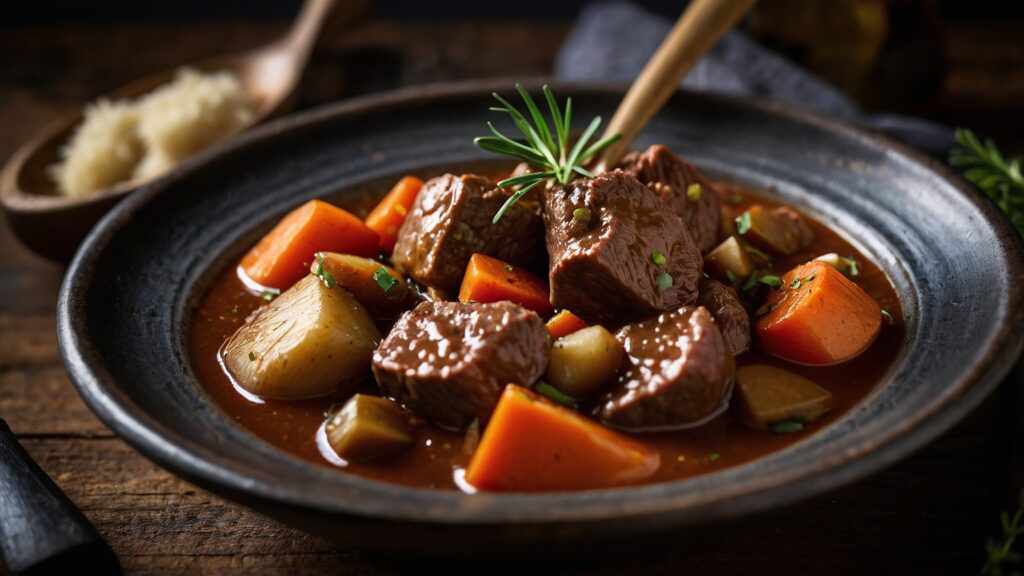
Instead of beef stew, what should you feed your cat for a nutritious diet? Here are some healthier alternatives:
- Wet/canned cat food – Look for grain-free, high protein varieties. Prioritize meat as the first ingredient.
- Dry cat food – Pick a reputable brand that offers complete and balanced nutrition.
- Lean cooked meat – Unseasoned boiled chicken or beef offer protein without fat or spices.
- Cat treats – Low calorie treats in moderation are a safer option than table food.
- Cat milk/broth – Lower calorie than beef stew drippings with needed nutrients.
- Cat supplements (as needed) – Consult your vet on supplements to fill any nutritional gaps.
For optimal health, feed cats a mix of high protein wet and dry food tailored for their life stage. Avoid unhealthy table scraps and foods with toxic ingredients like onion or garlic. Talk to your veterinarian if you have any concerns about your cat’s nutritional needs.
Can Kittens Eat Beef Stew?
Kittens should never consume beef stew. Kittens need very specific diets in their early developing months. The ingredients in beef stew are unsafe and inappropriate for growing kittens.
Beef stew risks causing:
- Digestive upset – Kittens have sensitive stomachs and immature digestive systems. The rich, fatty stew will likely cause vomiting, gas, and diarrhea. Their small bodies can quickly become dehydrated when sick.
- Nutritional imbalance – Kittens need proper ratios of nutrients like protein, fat, carbs, vitamins. Beef stew won’t provide complete nutrition.
- Onion/garlic toxicity– Kittens are even more vulnerable to toxic effects like Heinz body anemia. Effects can be deadly.
To thrive, kittens should eat specially formulated kitten food (wet and/or dry). After 6-12 months, they can transition to adult cat food. Always consult your veterinarian about proper diet for the different stages of your cat’s life.
FAQs About Cats and Beef Stew
Can cats eat beef broth from stew?
Beef broth may be safer than beef stew since it lacks vegetables, thickening agents, salt, and seasoning. But due to the beef fat content, it’s still best not to make beef broth a regular part of your cat’s diet. Small amounts once in awhile are less risky than full stew.
What human food can cats eat?
Some safe human foods for cats include:
Cooked plain chicken or turkey (no bones)
Lean deli meats (uncured, low salt)
Canned fish like tuna (low mercury)
Plain scrambled eggs
Small amounts of cheese (skip seasoned)
Baby food (meat varieties only)
Always avoid onions, garlic, chocolate, caffeine, grapes/raisins, dairy, raw meat/fish, bones, and excess salt or fat. Introduce new foods gradually in case it causes an allergic reaction.
Can cats eat potatoes or carrots?
Potatoes and carrots are not recommended for cats. The starchy, complex carbs and sugars are difficult for cats to digest properly. This can lead to upset stomach, diarrhea, constipation, gas, and excess calories leading to obesity. Avoid feeding cats these vegetables, especially in large amounts like in beef stew.
How much onion/garlic is toxic to cats?
Any amount of onion or garlic poses a toxicity risk for cats due to their lacking liver enzymes. Symptoms have been reported from small amounts like 5 grams of onion or 0.5 grams of garlic. To be safe, never feed cats anything containing onion or garlic, including beef stew.
The Bottom Line – Say No to Beef Stew for Cats!
In conclusion, beef stew should never be part of your cat’s regular diet. The ingredients commonly found in beef stew like fatty beef, onions, garlic, starchy vegetables, rich gravy or sauce can be extremely harmful to cats. Beef stew often leads to severe digestive upset or toxicity that requires prompt veterinary treatment.
For their health and safety, keep your cats far away from beef stew! If you want to share a special mealtime with your cat, choose safer human-grade cat foods without toxic additives or heavy seasonings. Your cat will thank you for sparing them the misery of stomach problems and more serious conditions like anemia from onions.
When in doubt about people foods, always check with your veterinarian. Let’s keep our cats happy and healthy for many wonderful years together!
Reference
[1] ASPCA. “People Foods to Avoid Feeding Your Pets.”
[2] VCA Hospitals. “Onions, Garlic, Chives.”
